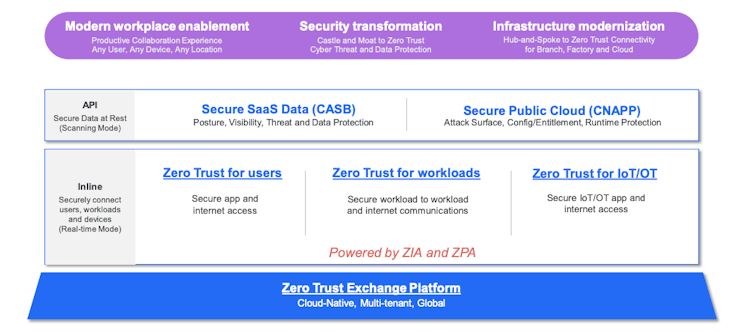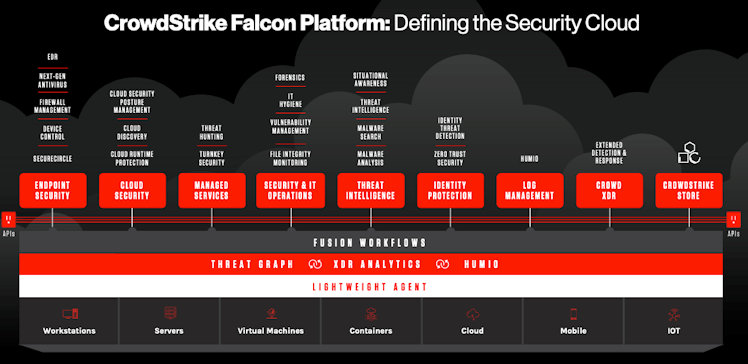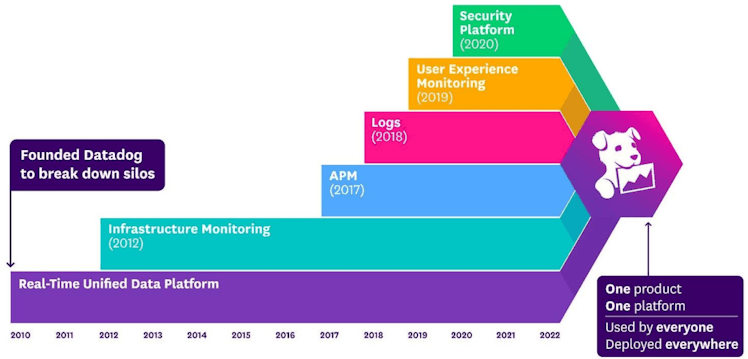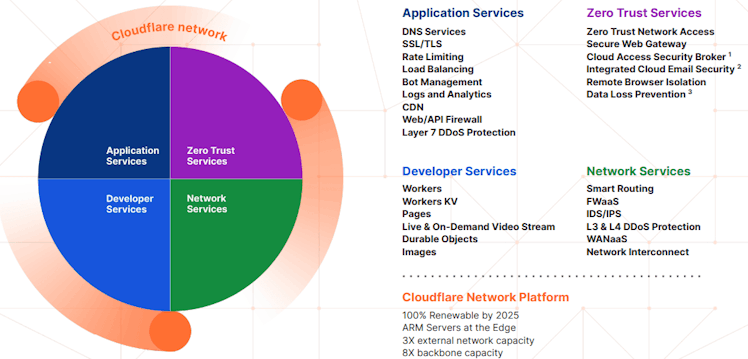Trending Assets
Top investors this month
Trending Assets
Top investors this month
Revisiting IT Platform Consolidation
Prior to Q2 earnings, I had a thesis that macro-induced pressure on enterprise IT budgets would result in consolidation of point solutions, favoring platform providers with a suite of product offerings. The idea is that technology budget owners (CIO, CTO, CISO) look for opportunities to reduce costs by eliminating redundant services and trying to concentrate spend onto fewer vendor platforms. This consolidation usually results in savings through volume discounts, fewer contracts and less operational overhead. It can also allow staff to be repurposed, who may have been dedicated to managing a particular vendor point solution.
The scope of consolidation can extend to open source projects or DIY internal solutions as well. These efforts are often appealing on the surface - the software license is free. However, they require commitment of the most expensive resource in an IT organization, namely engineers, to make them work. Faced with hiring freezes, IT leaders can repurpose software engineers who were managing these internal efforts to fill staffing needs supporting applications tied to revenue. They can then replace the open source service with a commercial managed service, often reducing cost. A fully loaded software engineer expense can reach $200-300k per year or more (considering total package of salary, benefits, office support, SBC, etc.). It doesn't take many engineers to cover the cost of a commercial product.
Now that last quarter's results are largely behind us for software infrastructure companies, we can revisit this idea to see if there was evidence of this consolidation activity. As it turns out, several software infrastructure companies noted this trend as part of their earnings report commentary and prepared remarks. Given that these kinds of consolidation efforts can take time, we will likely continue to see this theme play out. This will have implications for software vendors, with the outcome that providers of a suite of services will be better positioned in this market than smaller players with fewer offerings or point solutions. Additionally, we should see a thinning of the competitive set, as smaller private companies cut back their staffing investments and have more difficulty winning deals.
As a result of these conditions, many enterprises took advantage of the opportunity to consolidate vendor offerings to reduce costs. They also began migrating away from DIY or open source projects to an outsourced solution. I imagine that smaller upstart companies with a great product in a single segment had more difficulty closing deals. When every contract has to be scrutinized by the Finance team, an IT budget owner will be less likely to go to bat for an unrecognized, up-and-comer.
The platform vendor's offering can even be favored when the point solution provides a more complete feature set. An offering that is "good enough" for a particular segment becomes more compelling if its adoption can drive costs savings. In times of IT budget compression, idealized arguments for full-featured point solutions or the flexibility of DIY projects fall away quickly when jobs are on the line.
These themes were reflected in commentary and prepared remarks from several of the security and software infrastructure companies that reported earnings over the past month. Here are some snippets to illustrate the point.
Zscaler CEO
Now, where is the budget coming from? Number one thing CIOs and CFOs are asking now is, please help me eliminate a lot of point products. Help me save money. So cost reduction by elimination is a big thing and especially a platform like Zscaler, which can eliminate lots of products.

Crowdstrike CEO
Over the past several months, I have had many discussions with CIOs, and the message is clear. They are looking to consolidate on a platform like Falcon. They want fewer point products, fewer agents and technologies that consume fewer resources. They need to reduce complexity and simplify operations in their security and IT stack. Complexity is the enemy of security, efficiency and TCO. This business imperative is even more crucial in times when budgets are tightening, which accelerates standardization on trusted platforms that deliver immediate ROI and lower TCO such as CrowdStrike's Falcon platform.

So now that a true platform company is out there covering 22 modules, it really is the perfect opportunity with the current macro backdrop. And it certainly has stimulated the conversations in our ability to reduce costs and complexity for large and small companies. And then when you combine that with a very unique offering again with Falcon Complete, customers are – they are not interested in adding a bunch of heads, right? So they want to take advantage of the offerings that we have in that area where we can do it much more cost effectively and efficient than they ever can with a better outcome.
Datadog CEO
First, we signed a seven-figure upsell with a global services and audit company. This customer is going through a large-scale digital transformation including migrating from on-prem data centers to multiple clouds and in particular, Azure. They are consolidating nine disparate legacy principal tools to Datadog as their strategic platform and purchase all of our products, as well as our premier support and technical account management services.
Next, we had a six-year land with a Fortune 500 logistics company. Three years ago, this customer chose legacy monitoring providers and home-grown solutions over Datadog. Now our platform has come a long way since then. Meanwhile, incumbents were unable to meet these customers' needs, particularly around their communities adoption, leading to dozens of high-profile incidents a year with a high time to resolution. Additionally, this customer expects to save nearly $3 million in developer resources by consolidating multiple products with Datadog.

We also had a number of sizable six- and seven-figure new logo and expansion wins with companies that have recently experienced business contraction and announced staff reductions. These customers are looking to streamline their operations, save on engineering costs or consolidate multiple vendors on the strategic platform. We believe that software is a deflationary force and we are confident in our ability to help our customers do more with less, should economic conditions worsen.
Cloudflare CEO
Given our visibility early into the economic downturn, we rapidly adjusted our go-to-market message. We shifted our messaging to focus on ROI, helping customers save money, and consolidating spend from multiple point solution vendors behind Cloudflare's broad platform. Messages about saving money and using fewer vendors didn't particularly resonate a year ago, but they do today. Having a broad platform to solve so many customers' problems while at the same time saving the money is a superpower in times like these.

A Fortune 500 retailer in Europe signed a $1 million three-year deal for multiple Cloudflare products. They wanted to reduce their operational complexity by replacing a number of point solutions with Cloudflare's broad platform. We became their web application firewall, content delivery network, bot management system, and a number of other application protection services with our easy-to-manage platform. Having proven success protecting their infrastructure, we're now talking to them about expanding to be their Zero Trust provider, too.
Investor Take-aways
There is a distinction with the timeframe and level of effort for software infrastructure consolidation. At the top level, services that integrate through an installed software agent (like observability and security monitoring) can be swapped out pretty easily. These likely saw more consolidation activity in the prior quarter. At the other end of the spectrum would be databases, where a data migration and code changes would be required to move more application workloads onto a single platform. In the middle might be some application security services, Zero Trust and application delivery (like CDN). The more difficult consolidation efforts may be underway, but the business benefit for the new platform provider will take a few more quarters to realize. Investors can expect benefit for software infrastructure platform providers within varying timeframes, depending on the complexity of the consolidation effort.
The other benefit to the leading platform providers from these macro pressures will be the crowding out of smaller competitors entering the market with one or two point solutions. When IT budgets were flush, technology leaders could place a lot of bets on niche software infrastructure providers, in the hope that a few would emerge to deliver real competitive advantage for their teams. As IT budgets compress, the opposite effect takes place. IT leaders will have to justify bets on smaller providers with little name recognition. It's easier to convince a CFO to approve an IT budget line item for a brand name platform provider that checks several boxes.
While the macro environment is pressuring the growth rates of leading public companies in each category, most are still applying their large cash balances towards hiring more sales people and engineers. Their smaller, VC-backed competitors don't have this luxury. Most are freezing hiring in an effort to reduce cash burn and extend their runway. Public companies do take a hit on their stock price by reducing operating margin, but private companies generally don't have the option to keep spending in preparation for macro headwinds receding. Their VC backers want to avoid the dreaded down round.
This scenario will leave a lot of business for the category leaders to mop up, which I think we started to see in the last quarter. Most leading software infrastructure companies performed better than expected, considering the macro backdrop. This trend will likely continue. When the macro headwinds abate, the category leaders will be well positioned to capture the return of IT spend, before the smaller competitors can ramp up their sales efforts.
Combined, I think these factors of consolidation and culling of the competitive set will ultimately benefit the companies that are recognized as leaders in their categories and offer a platform of multiple services. Investors can look for companies that are modern, but established, enjoying high growth (shows relevance) and offering multiple related product modules that are easily bundled. While the macro environment is pressuring their growth currently, these providers could re-accelerate quickly as enterprise IT budgets relax. And their enterprise customers will have fewer competing vendors knocking on their doors.
Already have an account?